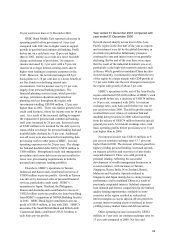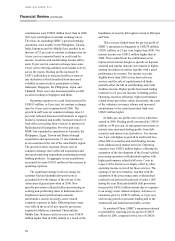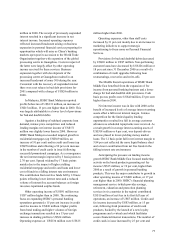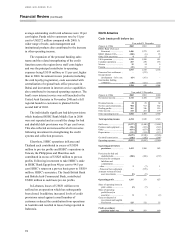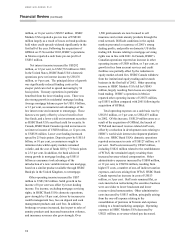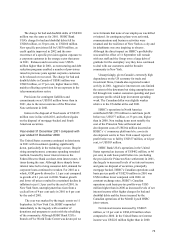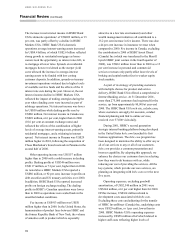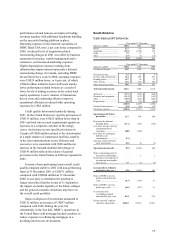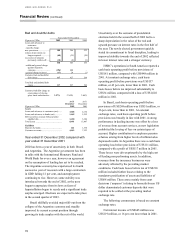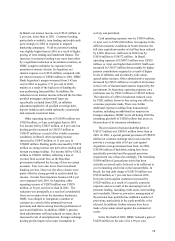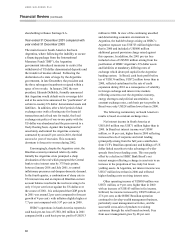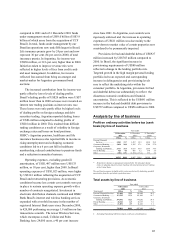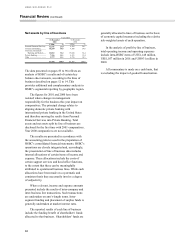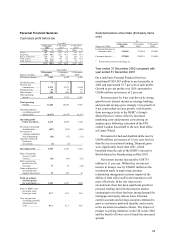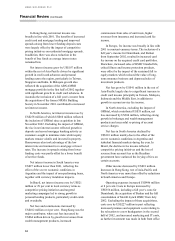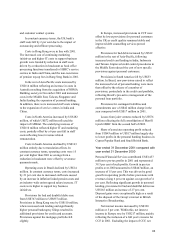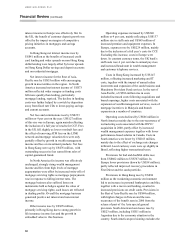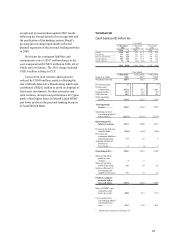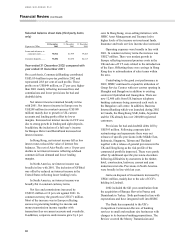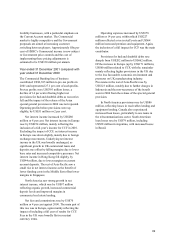HSBC 2002 Annual Report Download - page 81
Download and view the complete annual report
Please find page 81 of the 2002 HSBC annual report below. You can navigate through the pages in the report by either clicking on the pages listed below, or by using the keyword search tool below to find specific information within the annual report.79
In Brazil, net interest income was US$14 million, or
2 per cent, lower than in 2001. Customer lending,
particularly overdrafts, term lending and credit cards
grew strongly in 2002 in response to targeted
marketing campaigns. Yield on customer lending
was slightly higher than in 2001 as a result of higher
pricing of term lending and instalment finance. The
increases in customer lending were more than offset
by a significant reduction in investment securities, as
HSBC sought to minimise its exposure in the
uncertain economic climate. In Argentina, net
interest expense was US$16 million, compared with
net interest income of US$85 million in 2001. HSBC
Bank Argentina’s margin worsened from 5.65 per
cent in 2001 to negative 2.71 per cent in 2002,
mainly as a result of the high cost of funding the
non-performing loan portfolio. In addition, the
reduction in net interest income reflected the fact that
pesified mortgages and personal loans are
specifically excluded from CER, an inflation
adjustment applied to all pesified sovereign debt,
deposit balances and certain (primarily commercial
and corporate) customer loans.
Other operating income of US$596 million was
US$24 million, or 4 per cent higher than in 2001.
Fee income fell by US$27 million, or 8 per cent, but
dealing profits increased by US$133 million to
US$147 million as a result of the volatile economic
conditions. In Brazil, other operating income
increased by US$47 million, or 11 per cent, to
US$489 million. Dealing profits increased by US$74
million on strong interest rate derivatives trading and
foreign exchange trading. Fee income fell by US$22
million to US$281 million, reflecting a loss of
revenue from account fees, as the Brazilian
government outlawed the levying of fees on certain
accounts. Fees were also lower from investment
banking services. However, the above factors were
partly offset by strong growth in credit-related fee
income. Income from insurance business fell 4 per
cent compared with 2001. In Argentina, other
operating income of US$70 million was US$39
million, or 36 per cent lower, than in 2001. The
reduction was principally as a result of considerably
lower net revenues from the insurance businesses.
HSBC was obliged to renegotiate a number of
contracts as a result of the mismatch between
premiums and claims arising from the pesification of
assets and liabilities. In addition, HSBC’s pension
fund administrator suffered reduced revenues due to
increased levels of unemployment. Foreign exchange
dealing profits improved as some resumption in
activity was permitted.
Cash operating expenses rose by US$39 million,
or 4 per cent, to US$1,060 million. In response to the
difficult economic conditions in South America, the
full time equivalent number of staff has been reduced
by 2,000. However, staff costs in 2002 rose by
US$16 million to US$572 million. In Brazil,
operating expenses of US$873 million were US$32
million, or 4 per cent higher than in 2001. Staff costs
increased by US$17 million driven mainly by higher
pension contributions required as a result of higher
levels of inflation, and an industry-wide union-
agreed salary increase. Other administrative expenses
increased by US$15 million as a result of an increase
in the levels of transactional taxation imposed by the
government. In Argentina, operating expenses on a
cash basis rose by US$13 million to US$165 million.
The reduction of 1,000 in headcount reduced costs
by US$2 million, however this saving was offset by
severance payments made. There was further
additional expense resulting from transactional
taxation, including an additional tax imposed on
foreign companies. HSBC wrote off during 2002 the
remaining goodwill of US$20 million that arose on
the purchase of its insurance subsidiaries.
The provision for bad and doubtful debts of
US$117 million was US$361 million lower than in
2001. In 2001, a special general provision of US$292
million (at constant exchange rates) was raised to
provide a coverage ratio of 63 per cent against
Argentina’s non-government loan book. In 2002,
US$196 million of bad debts arising have been
specifically provided and the general provision
requirement was reduced accordingly. The remaining
US$96 million of general provisions has been
critically reviewed and is believed to be sufficient to
cover remaining credit risk in the loan portfolio. In
Brazil, the bad debt charge of US$139 million was
US$10 million, or 7 per cent lower than in 2001.
New provisions against customers increased by
US$29 million, as a result of a specific corporate
exposure and as a result of the increasing level of
personal lending, including credit cards, term lending
and overdrafts. However, pro-active management of
the personal loan portfolio has enabled a number of
provisions, particularly in the cards portfolio, to be
released. In addition, further releases have been
made of provisions raised against the commercial
sector.
In the first half of 2002, HSBC realised a gain of
US$38 million on the sale of its 6.99 per cent


